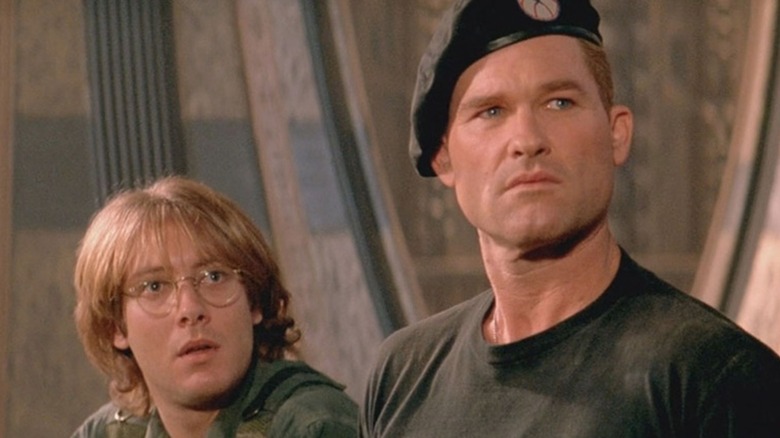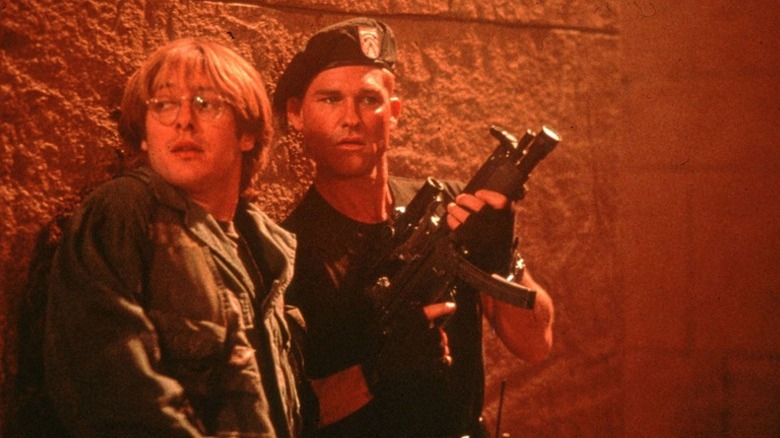Kurt Russell Had To Drag James Spader Out Of His Trailer For Stargate
It's fair to say no one goes to a Roland Emmerich movie expecting Shakespeare (except, you know, when he makes an actual movie about the dude). Ever since breaking through with the sci-fi action hit "Universal Soldier" in 1992, his name has been synonymous with switch-off-your-brain blockbuster entertainment. At his best ("Independence Day," "2012," and "White House Down"), he thrusts a colorful assortment of stars and character actors into a series of mayhem-laden set pieces with a gleeful shamelessness unseen since the heyday of Irwin Allen. He's well aware of his dialogue-writing shortcomings, and casts big personalities like Will Smith, Jeff Goldblum, Judd Hirsch, Oliver Platt and so on to sell the heck out of his implausible exposition and shopworn banter.
When it works, it's Arby's. When it doesn't, it's hour-old Arby's.
Take "Stargate" for example. Emmerich and co-writer Dean Devlin's follow-up to "Universal Soldier" was an ambitious, big-budget attempt at an off-brand Indiana Jones adventure starring James Spader as a bookish Egyptologist who gets recruited by a hard-nosed U.S. Air Force colonel (Kurt Russell) to guide them through the titular portal and help them figure out if the alien civilization on the other side is a threat to humanity. It's a riff on the goofy aliens-built-the-pyramids theory, and Emmerich is a gifted-enough director to inspire genuine visual awe via his gee-whiz Spielbergian sensibilities and first-rate-for-the-era CG (some of which holds up pretty well 30 years later).
While "Stargate" looks spectacular, it gets hung up by slack pacing in the second act and rendered almost terminally risible by some utterly atrocious dialogue. Indeed, the latter was so awful that Spader demanded rewrites during the shoot. In doing so, he incurred the wrath of his ultra professional co-star.
'If it was brilliant, you'd do it for free'
In a 2019 Variety article commemorating the 25th anniversary of the film's release, Dean Devlin recalled Spader repeatedly pushing back on the dialogue, which should answer any questions on what Spader's opinion on "Stargate" was in general. He was at a critical juncture in his career. Despite critically acclaimed performances in "Sex, Lies, and Videotape," "Bad Influence," and "White Palace," he couldn't quite hit the A-list big time.
Russell, who by this point had seemingly made his peace with being a second-tier star, had no illusions about the film he was making. He was hired for his commanding screen presence (after turning the filmmakers down multiple times), and intended to deliver what Emmerich expected with nary a quibble. So when Spader's unhappiness got in the way of his job, he got in his co-star's face.
According to Devlin:
"There was one day where [Spader] wouldn't come out of his trailer until we rewrote the scenes. Kurt Russell got very upset with him. He burst into his trailer and said 'What are you doing?' And Jim said, 'Come on, admit it. The dialogue is horrible.' Kurt Russell said, 'Of course, it's horrible. That's why they pay you a million dollars. If it was brilliant, you'd do it for free.'"
"Stargate" isn't a classic. It actually isn't very good at all. But it looks like one of those '80s escapist sci-fi blockbusters we grew up loving, and is so unabashedly aware of its limitations that you can't hate it. The film didn't do much for its stars, but they did get paid and, thanks to Russell, they both got out of their trailers every day and earned their million-dollar salaries.

